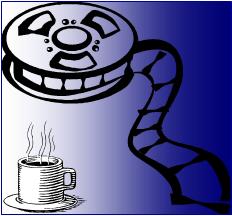

|
 |
Mildred Pierce
|
Please go to the new Coffee Coaster site implemented more gracefully in Wordpress. Full conversion by 9/12. This page @ http://brianrwright.com/CoffeeCoasterBlog/?p=2128 |
Joan Crawford ... Mildred Pierce Beragon
Jack Carson ... Wally Fay
Zachary Scott ... Monte Beragon
Eve Arden ... Ida Corwin
Ann Blyth ... Veda Pierce Forrester
Bruce Bennett ... Albert ('Bert') Pierce
Jo Ann Marlowe ... Kay Pierce
Veda: With this money I can get away from you. From you and your chickens and your pies and your kitchens and everything that smells of grease. I can get away from this shack with its cheap furniture. And this town and its dollar days, and its women that wear uniforms and its men that wear overalls.
Veda: You think just because you made a little money you can get a new hairdo and some expensive clothes and turn yourself into a lady. But you can't, because you'll never be anything but a common frump whose father lived over a grocery store and whose mother took in washing.
Veda (Ann Blyth), Mildred Pierce's daughter of a broken marriage, is the original spoiled brat, the princess who seeks to live beyond her means, while holding in contempt those who provide the means. Mildred (Joan Crawford) is the original liberated woman: when her husband loses his job and self-respect, then leaves her for another woman, Mildred busts the hapless Suzy Homemaker image, first, working as a waitress (trying to hide that fact from snooty Veda) and, second, putting together some serious change to open a posh restaurant-bar on the ocean.
In the first 20 minutes, every stereotype of men and women—of their roles and responsibilities, of their sexual needs/interests—, of children, the American business caste system (or lack thereof), and how real families coped in middle-class, post World War II reality is tossed up in the air for harsh examination. And this movie was made in 1945?! And oh, by the way, there's been a murder... of a man with whom Mildred has had an affair. The murder occurs in her home. The police are sifting through the evidence and suspects, and they're interviewing her.
The story proceeds from her flashing back, at the police station. We won't give the whodunit away; I will say the exploration of motives, means, and opportunities provides a complex yet taut crime thriller. The police inspector informs Mildred that their first suspect, of all people, is her ex-husband Bert (Bruce Bennett). She protests vehemently, knowing him to be gentle man; we're sent back to the beginning of the story. Despite Bert's hard times and indiscretions, we see he's standing up for treating their two daughters Veda (Ann Blyth) and the child Kay with some degree of honesty.
It's true, Mildred, for reasons we partly discover later, has a need to mold the girls into a vicarious life of Mildred's longing: Veda, who feigns acceptance, receives dancing lessons and other learning luxuries worthy of a budding socialite. Kay is a free spirit, still in her tom boy phase, as her mother insists on cloistering her with piano and other rigors. Father Bert is trying to rescue the girls, but, sans job and otherwise sacrificing his manhood, loses any hope of winning the morality battles with his strong-willed wife. Then, poof, he's out of the picture. They separate and he moves in with the girlfriend; remarkable in 1945 that a movie is so upfront about his liaison and quick disconnection down the road.
In many ways the Mildred Pierce is a morality play for this married, then separated, then unmarried, then married again... woman. Uniquely, the film features a woman as the leading character about whom all the men come and go. The sociology is fascinating, too, for that time. Southern California beach cities' living—it appears to be north of the Los Angeles area proper, which wasn't nearly so developed immediately post WW2—is revealed as a clash of social ambition and middle-class productive class values. Despite Mildred's attempting to live (via her daughters, initially, then more and more for herself) above her means, when she loses the breadwinner she takes an entry level day-laborer job—waitress.
That's the middle class values for you. Since early in her life, Mildred has known Wally Fay (Jack Carson)—a man of the world, entrepreneurial sort, always on the look out for buying low and selling high. While she's been married, living an upper middle class existence, Wally has served as the couple's financial advisor/real estate agent. He's assertive with Mildred, and you realize straight away that he wants her and always has; but Mildred has insisted he keep his distance that way. He's a wolf. She doesn't want him as a lover, but as a friend. And he still hangs out with her, helps her. How does that work in 1945 Los Angeles? Well, it works because Mildred wants it to work. Is she an unfeeling control freak when it comes to men?
Good question.
The answer may lay in how she handles the next man she meets, a dashing Mr. Monte Beragon (Zachary Scott). Beragon is a semi-playboy who owns a property on the beach that Wally finds out about. Wally, who does have money from his own prodigious energy, knows that Beragon has run into some financial difficulties—Monte comes from a wealthy family, but there's not a lot of love, he's always teetering on being cut off by a rich aunt or mother, I forget which. Thus Wally, knowing Mildred's ambitious and hardworking nature, realizes she will probably look at buying Monte's property on the cheap and turning it into a gold mine. Which, ultimately, she does, in record time.
Then does she have an passionate affair with Beragon? Or is it a hookup of convenience for the both of them? This gets back to the question of whether Mildred is a controller of men. The answer is definitely. This is probably as gorgeous as Joan Crawford ever looked on screen, even with the not-so-revealing two-piece bathing suit she comes within hailing frequency of Bo Derek in 10. But as for some genuine heartfelt hokey pokey, yes, we're given to understand they're doing it... well, sex is a low priority, for both of them. [You realize this is 1945, before gay men existed, but to me the Beragon character seems gayish.]
As Mildred works her way with Beragon (and he's a manipulator, too, getting quid pro quo), you finally start to gather the full measure of her motivations and needs. His are pretty obvious, by connecting with Mildred, he's going to be with a productive engine that will eventually supply all that new money to replace the old money that isn't so secure anymore. On her side, you see that Mildred—for all her self-reliance and drive—wants to be thought of as the genteel rich, having so much money that needing to do any actual work is considered a faux pas. This explains the off-the-charts fur coats and other accouterments of her relationship with Beragon. Being thought of as old wealth she hopes will also impress her daughter Veda; mom and daughter have the same addiction, except, in addition, mom is addicted to daughter.
The movie plays out magnificently. Does one like Mildred Pierce? Tough call, but I like her. She seems to handle her addictions with a touch of self-awareness and moral concern. The woman I truly like in the film is Mildred's friend Ida (Eve Arden), whom I consider equally gorgeous. My sense is the writers didn't know how to deal with Ida, who is at once sexually appealing and lovable, exceptionally witty, but in a few dialogs, for indecipherable reasons, they imply she's mannish—at least as perceived by Wally. A puzzle. Perhaps the writers are gay, they don't 'get' real women. But what am I saying, there weren't any gays in 1945. :)
Sui generis. A bold, ingenious, complex, highly watchable, thought provoking movie. Even without the murder mystery.
###
2011 March 30
Copyright © Brian Wright | The Coffee Coaster™
Mildred Pierce | Joan Crawford | Ann Blyth |
Jack Carson | Film Noir

| Publish Fee: $25 Donation |  |
Please donate $1 for download of PDF
|
||
| |